Termination letters are vital documents for any business that allows employers to formally dismiss an employee in a respectful and professional way. In this article, the components of a termination letter, its importance, and everything regarding the writing process will be discussed.
Termination letters are important files that are used to document and state that an employee’s time at a business has come to an end.
It should include relevant information surrounding the reason for contract termination. It can also include additional details such as severance benefits, the date of their final paycheck, and anything else that the company may need to include. Ideally, it should be signed by either a manager or a member of Human Resources.
A termination letter is also known as an employee termination form, employment termination form, employee termination letter, a letter to fire an employee, a pink slip, and a separation notice. Regardless of the terminology used by the organization, all of these documents will follow a similar structure and include the same type of information.
Free Templates
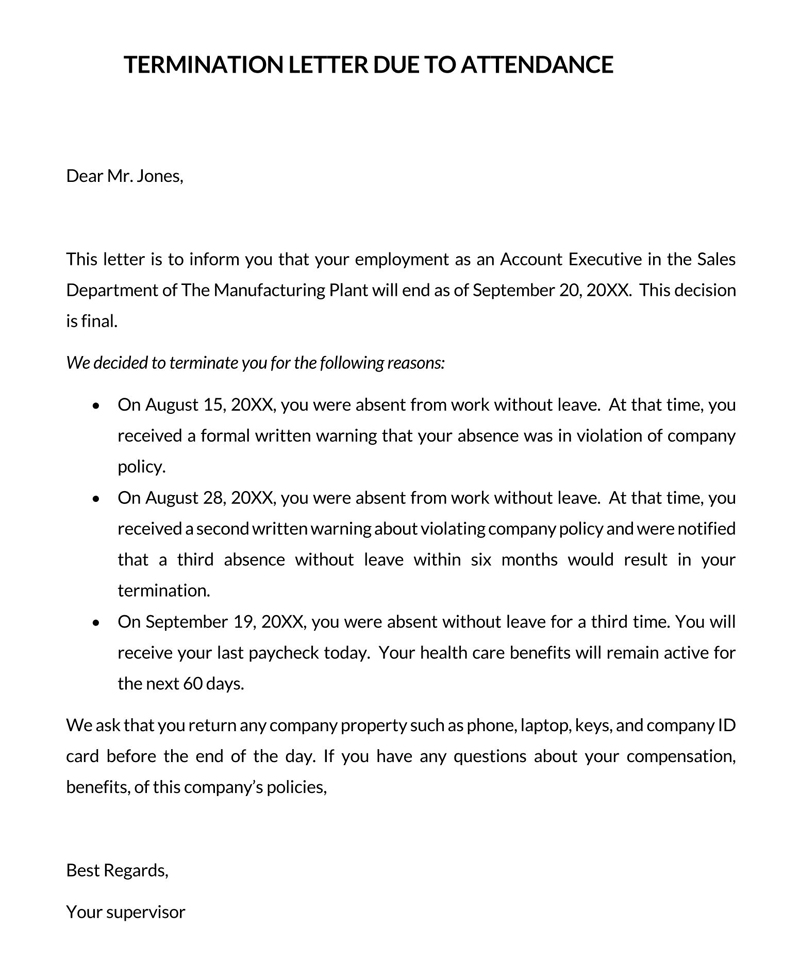
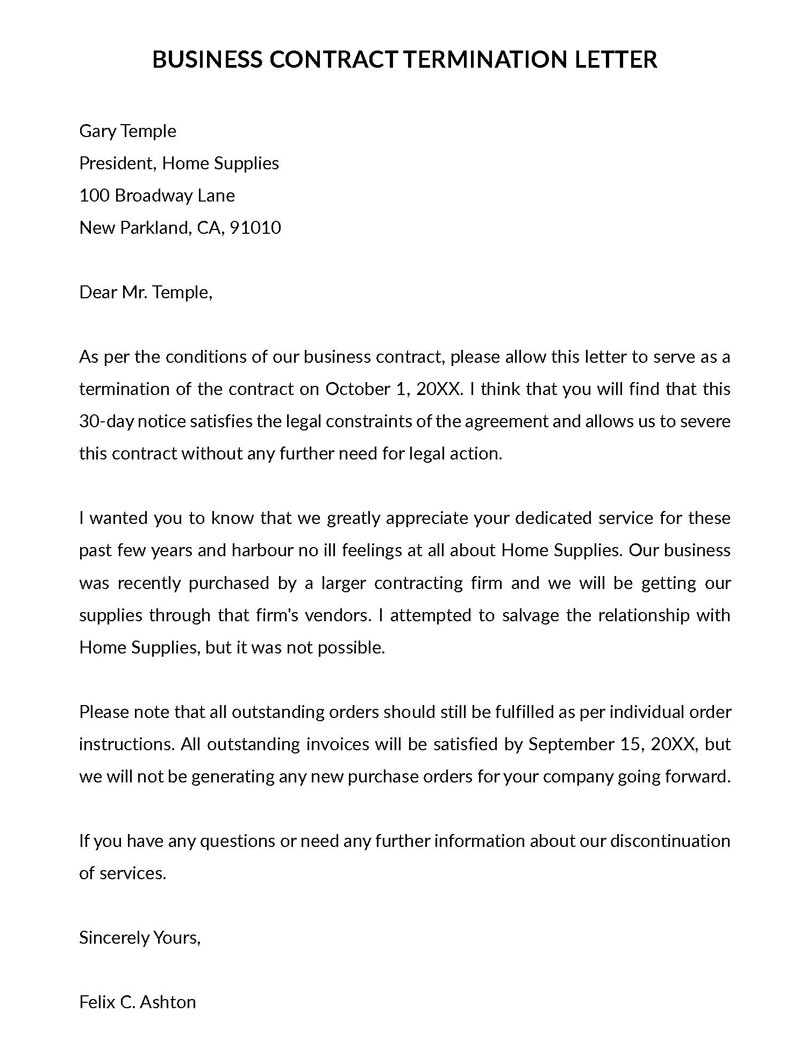
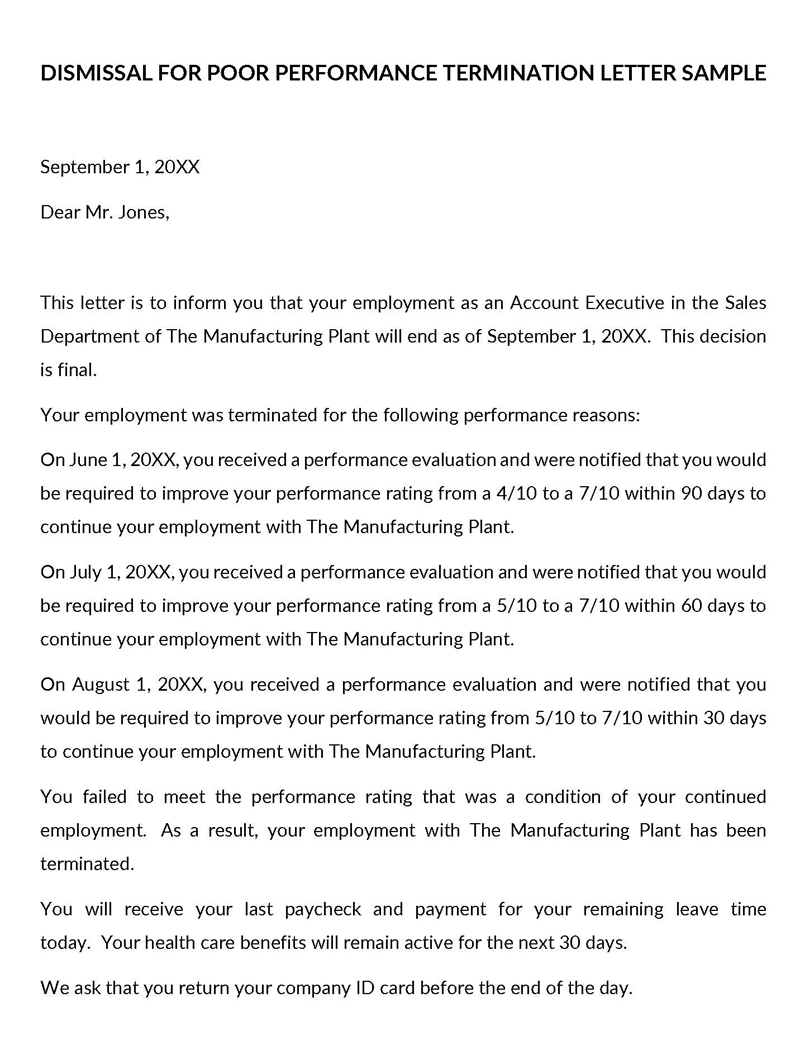
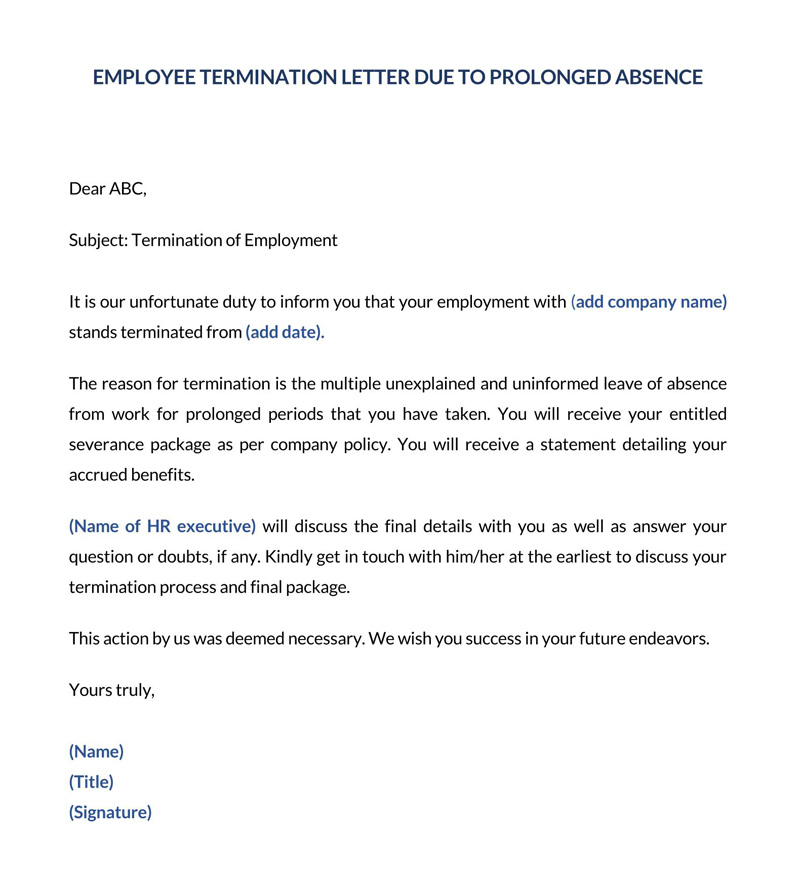
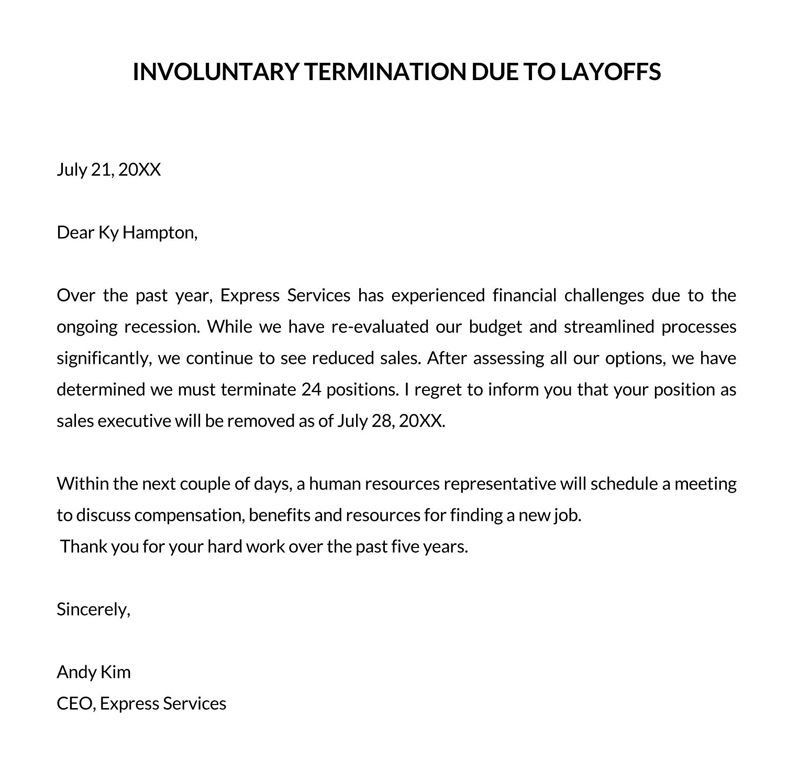
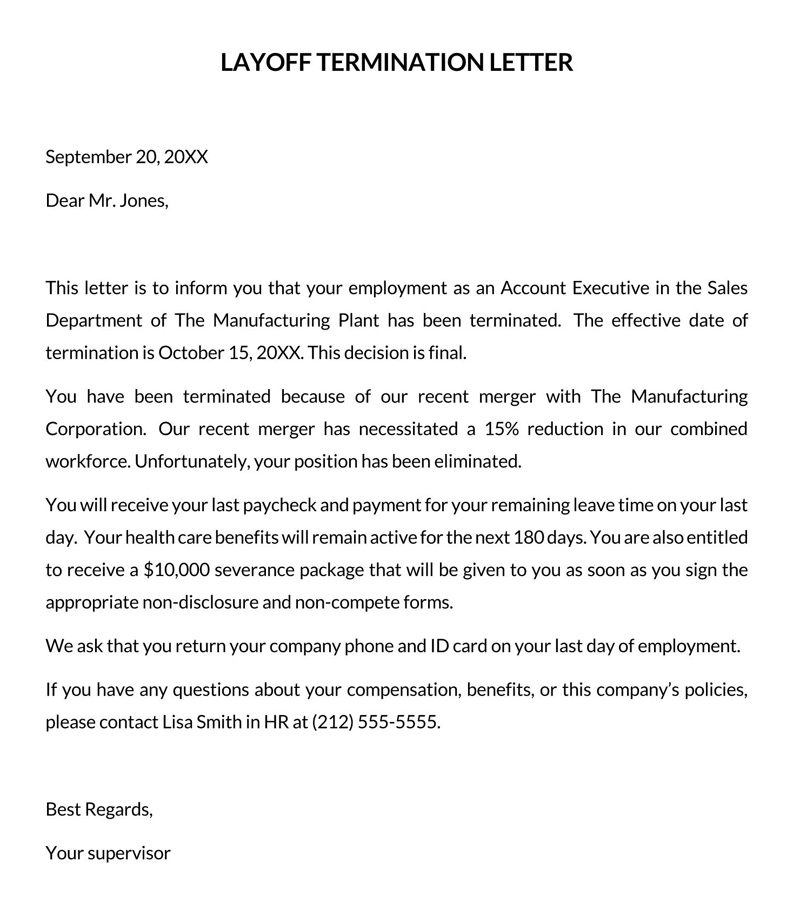
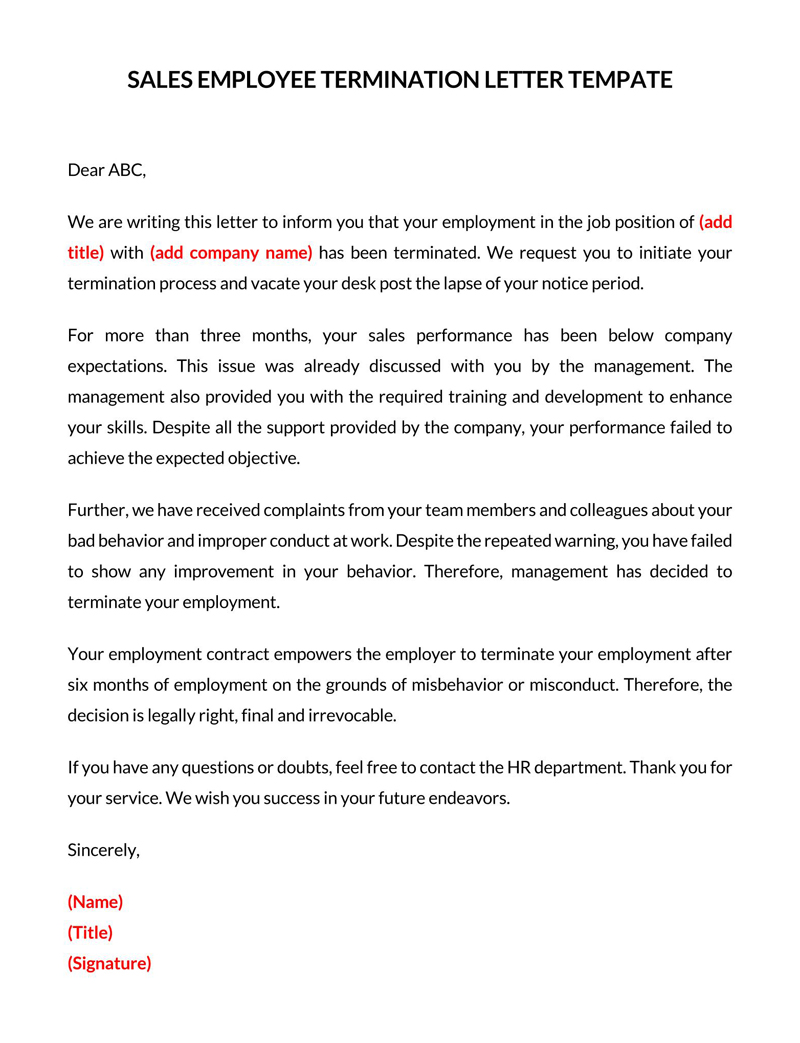
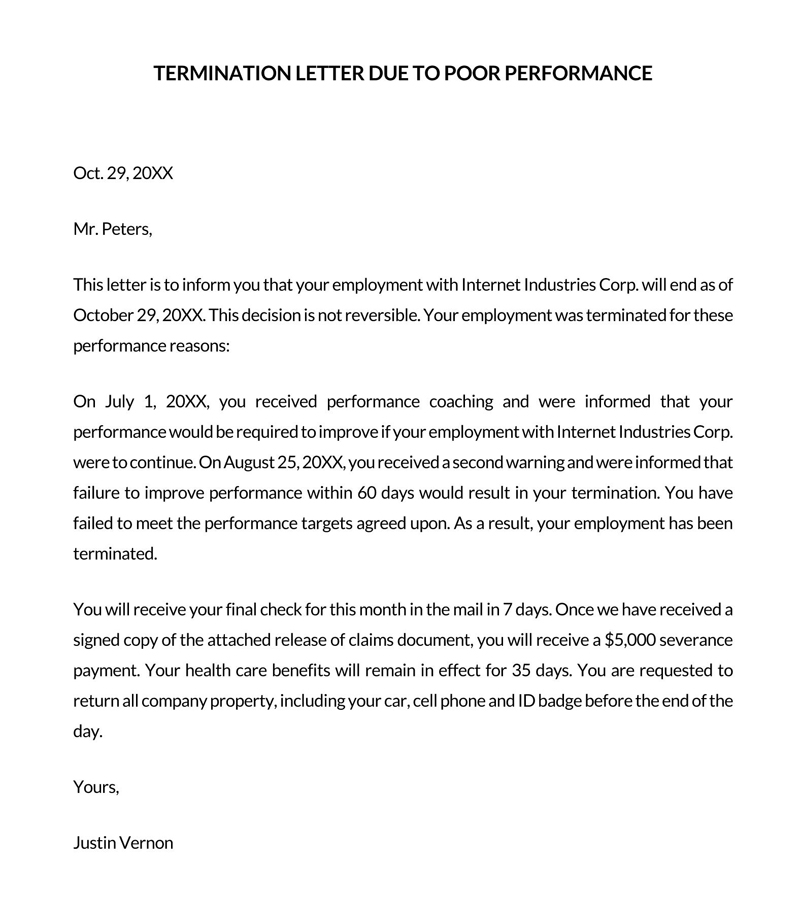
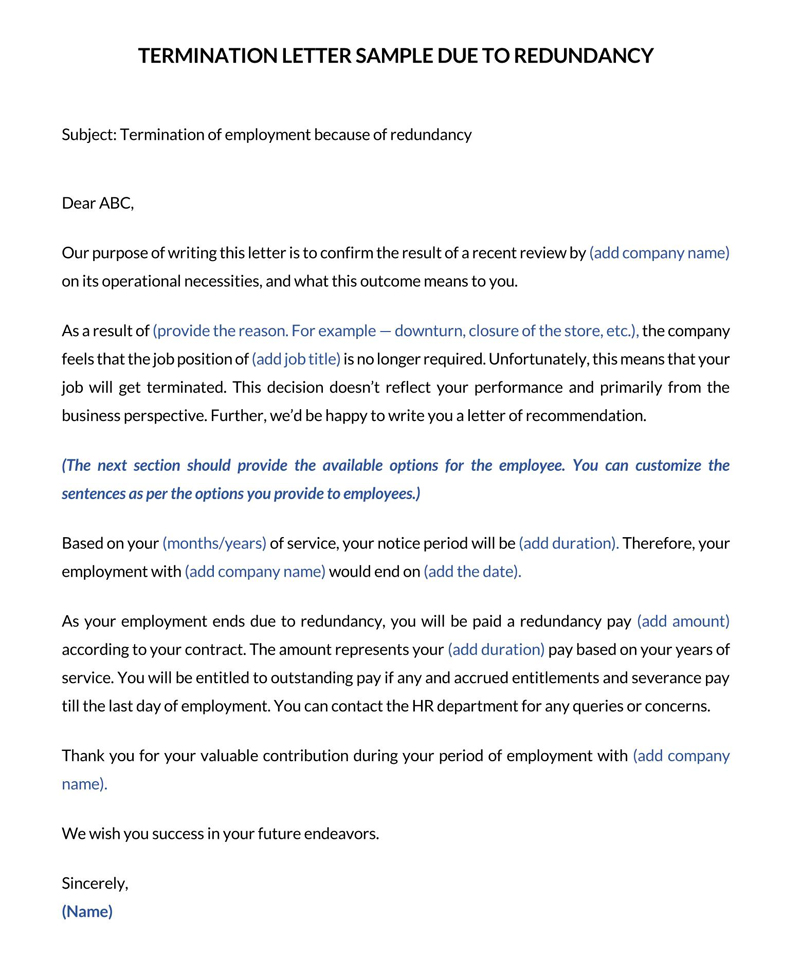
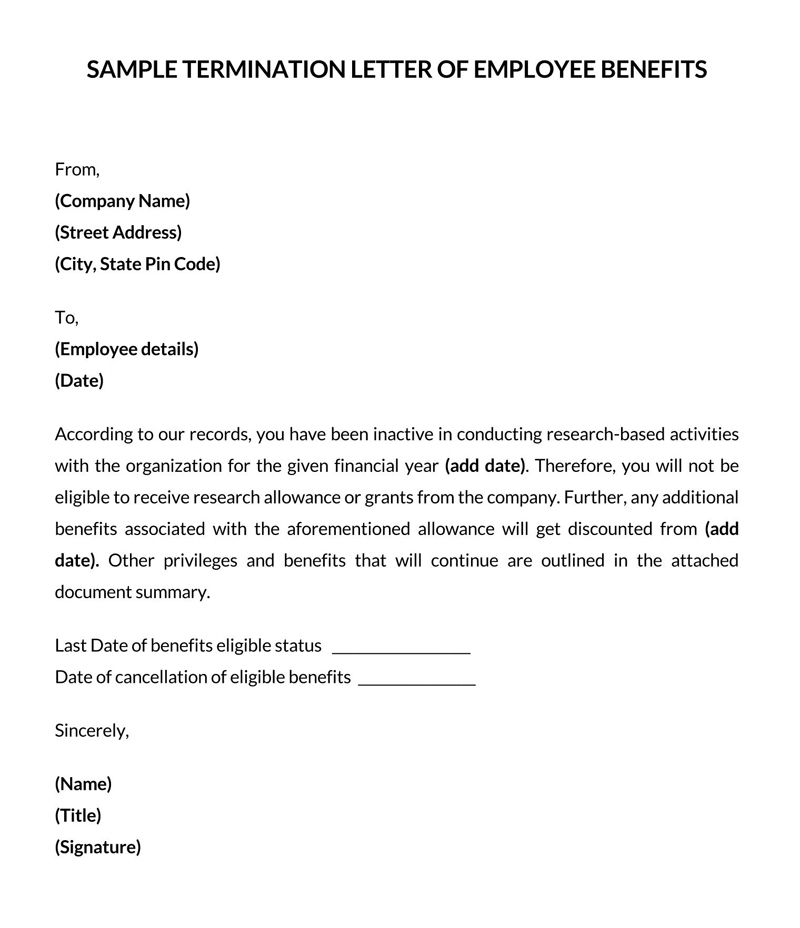
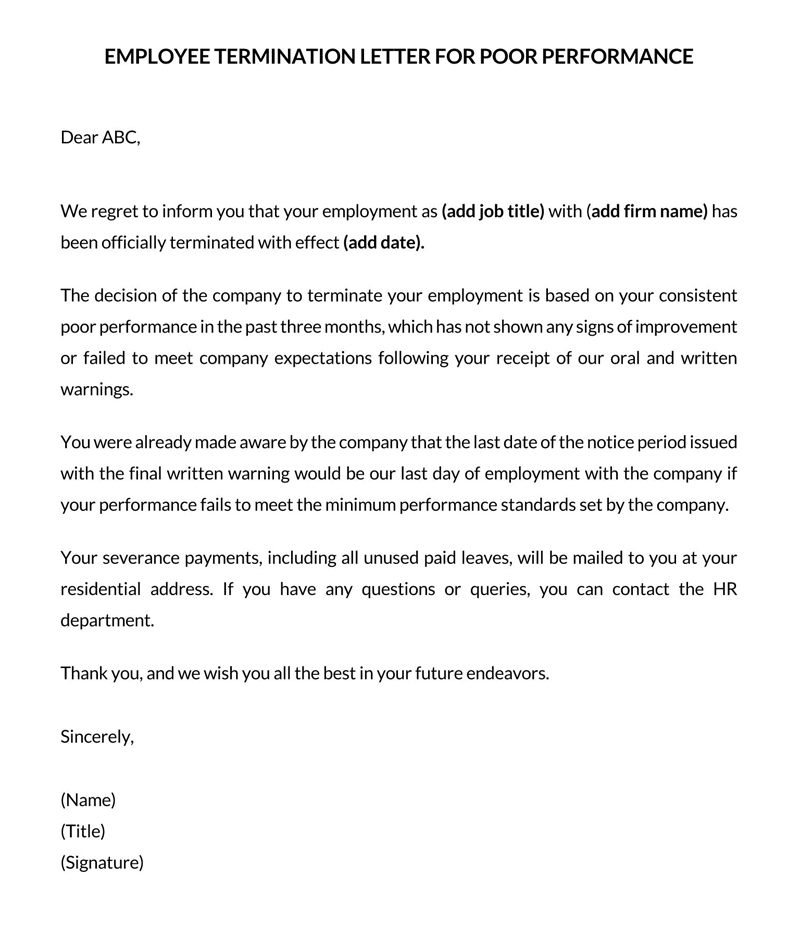
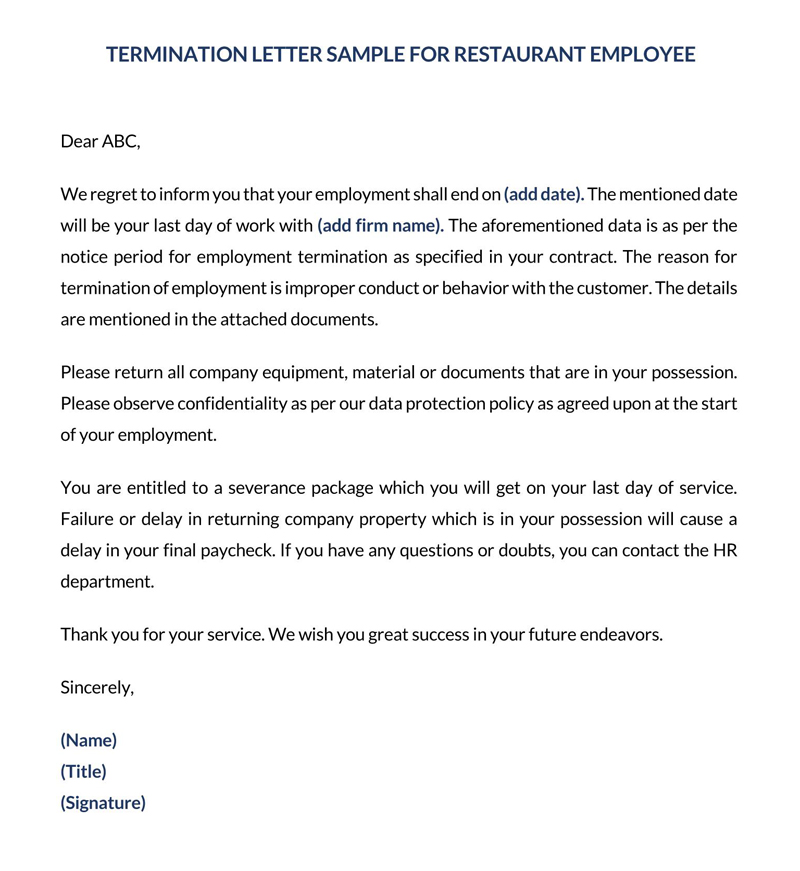
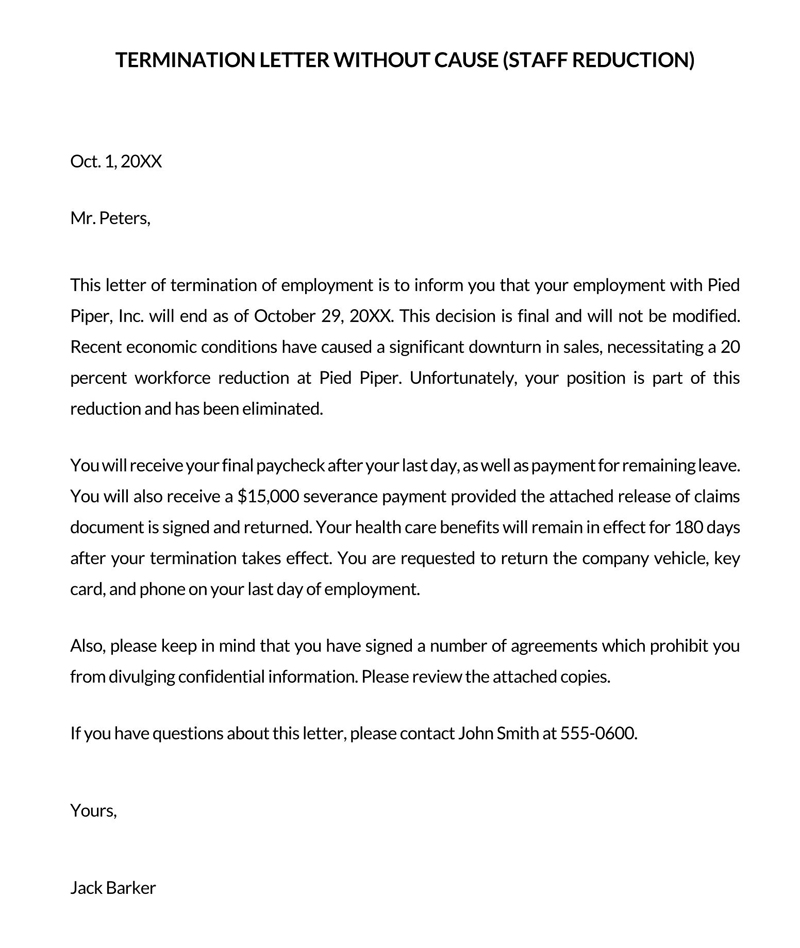
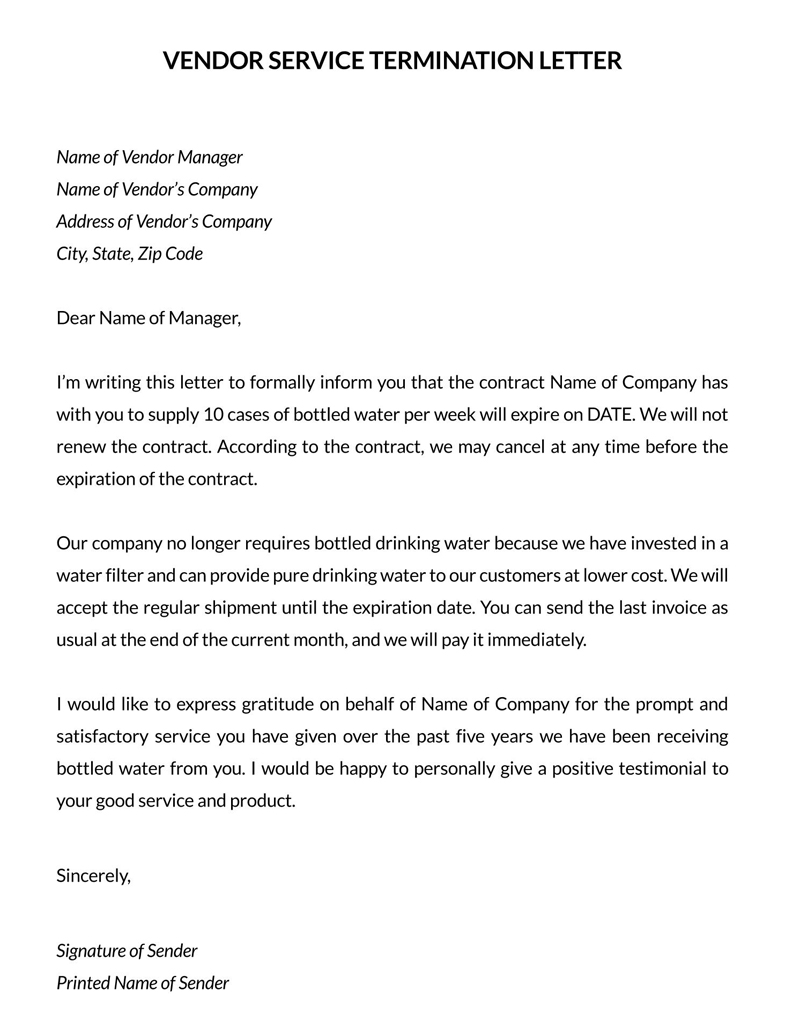
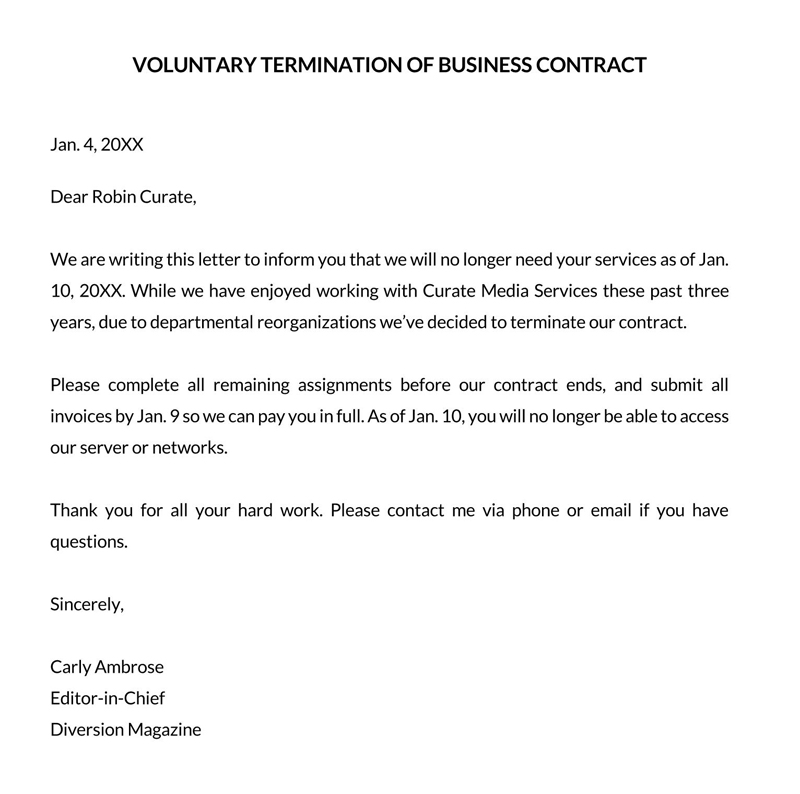
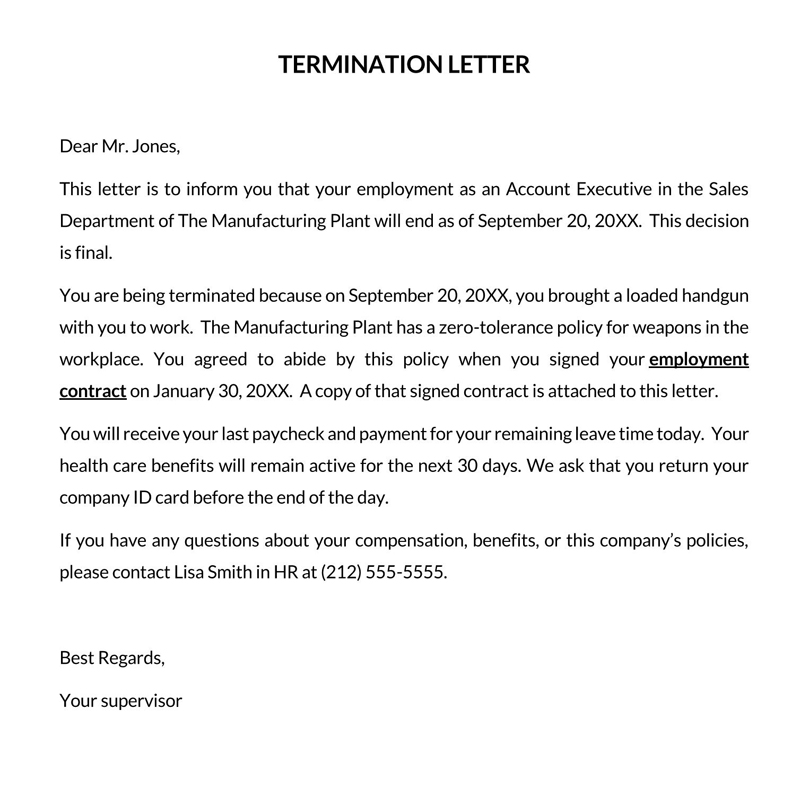
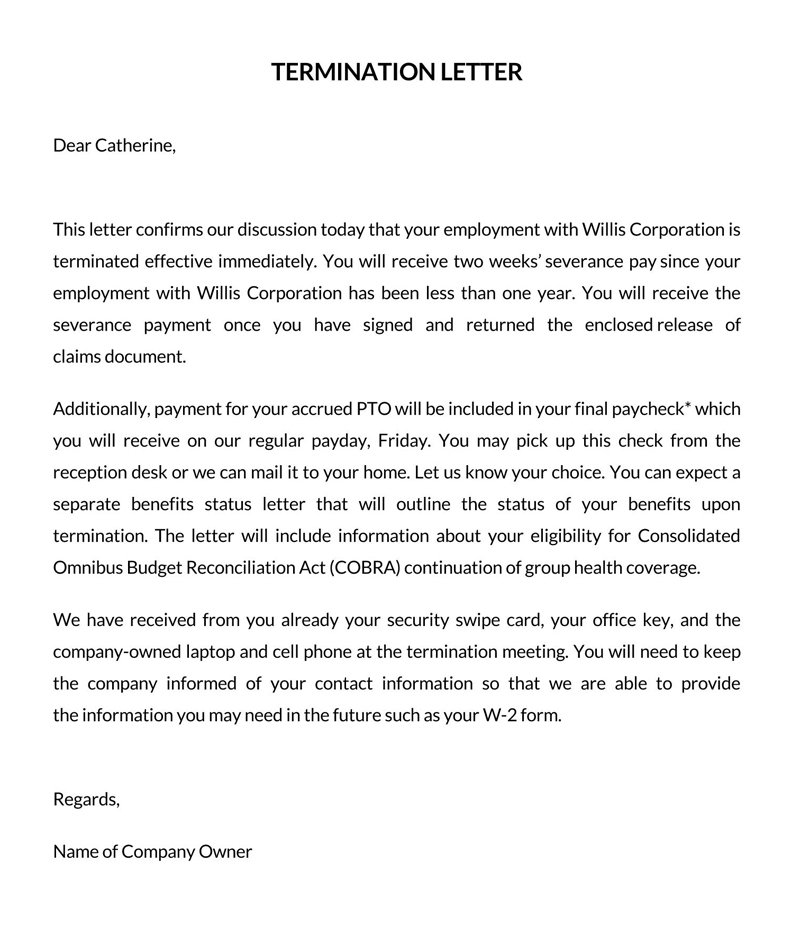
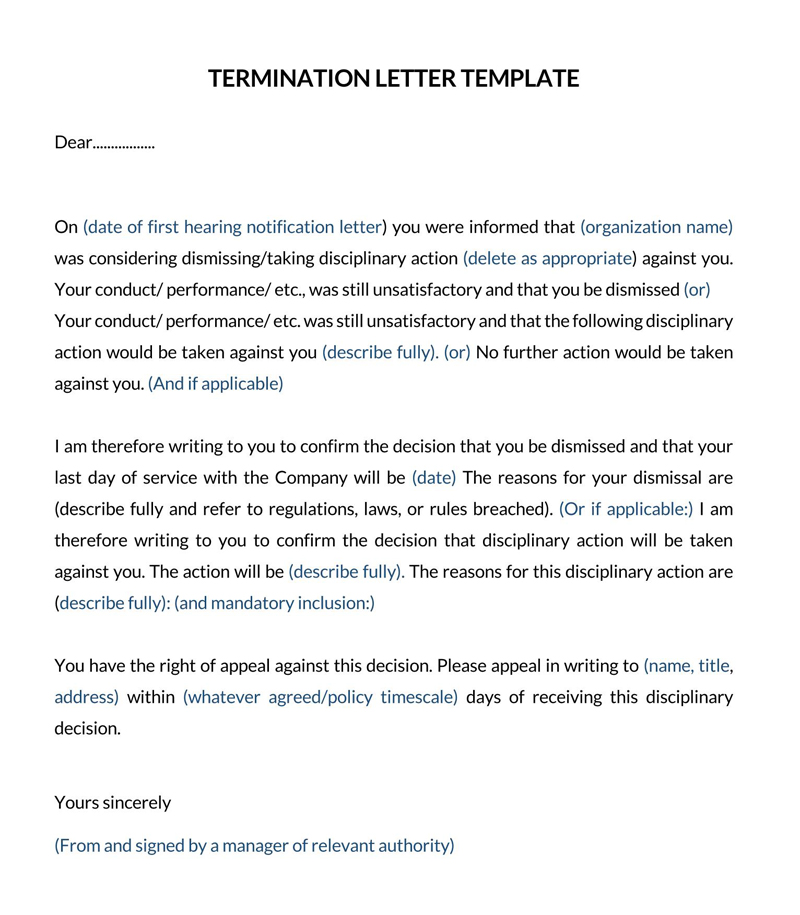
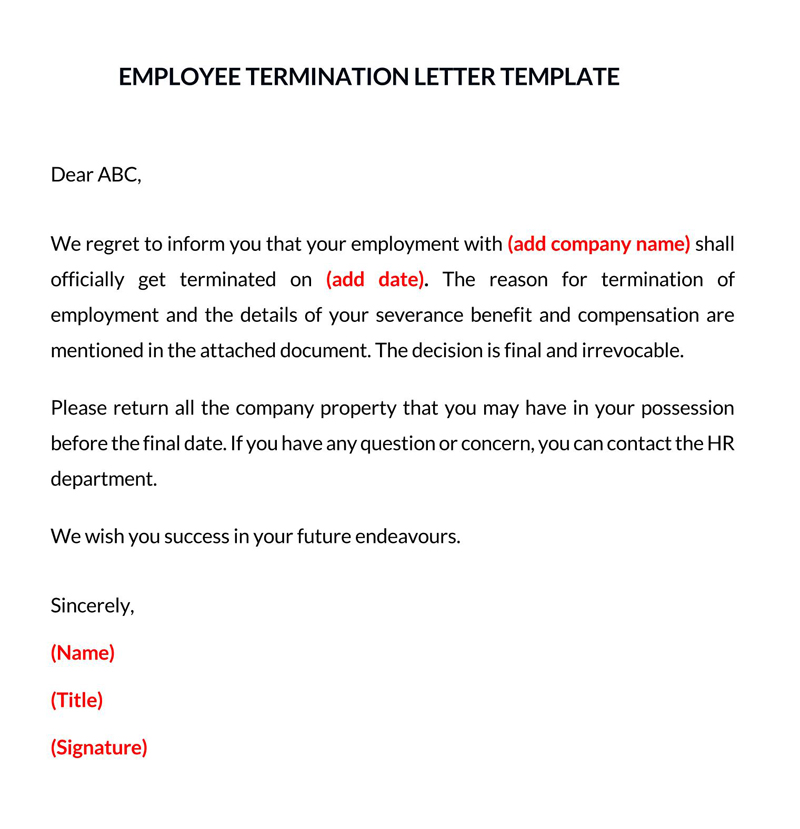
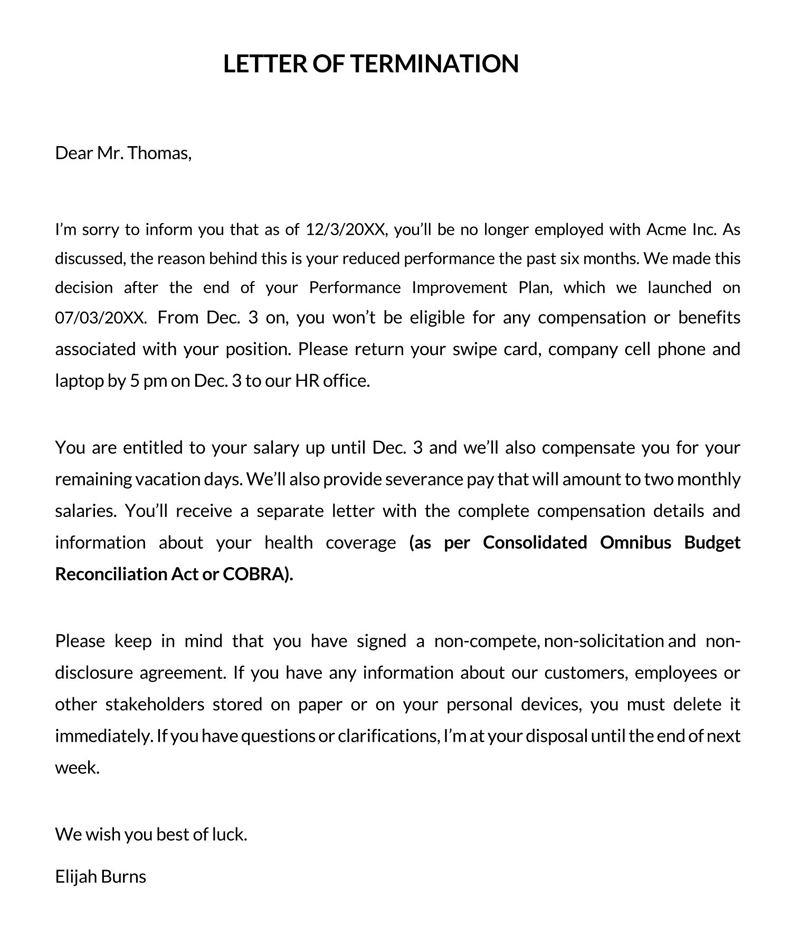
Importance of Termination Letter
A termination letter is essential for a company because they form a crucial part of good business practices. Upholding a high level of professionalism through official documents develops a good reputation for the company and protects them legally. Additionally, it respects the employees facing dismissal, assists them with their transition, and maintains a positive relationship with the remaining employees. In general, an employer can end employment with any individual at any given time for any given reason. However, this dismissal may not be discriminatory or given to an individual with a union agreement
When to be Used?
Termination letters should always be used when terminating an employee. Although they may seem like only a common courtesy, they are often a part of internal HR policy and, in many cases, legally required.
For example, it may be legally required by the state to use a formal termination letter. In addition, employees who form part of a union or another collective bargaining agreement must also be handed a termination letter.
In other cases, such as when employees are not eligible for unemployment benefits, providing a termination letter is appropriate. And finally, if the company believes the employee should be provided with the exact details regarding their dismissal or if the company believes it is wise to document the context of the termination legally, a termination letter is strongly recommended.
These termination letters may be used in many different cases. In cases with cause, this means that the employee’s behavior, performance, or other actions have been grounds for dismissal. In cases without cause, there is no specific reason related to the employee, but rather it could be a case of downsizing or other larger factors unrelated to that individual. Finally, a termination letter could be necessary simply to signify the end of a business contract, when all business relations between the two parties have come to a natural end.
Employment Vs. At-will Contracts
An employment contract can result in termination if a timeline is specified, if certain factors regarding the employment are deemed unsatisfactory, or in cases of inappropriate behavior, unsatisfactory performance, or breaking any legal agreements. At-will contracts, however, mean that the employee may be terminated for any reason at any time. However, this depends on where the business is located, as many State and local laws may protect employees, regardless of the type of employment established.
Steps to Terminate an Employee
An employee should be dismissed from a company in the most possible civil way, both out of respect and compassion towards the employee and so that the business is not faced with legal repercussions.
Some recommended practices regarding employee termination include:
Select a time of notice to be given
Depending on both the employee and the context of termination, an employer must decide how much notice is deemed appropriate. For example, in cordial situations, an employer may respect a two-week notice of termination, but it is recommended to carry out the dismissal immediately in hostile situations.
Decide a day according to the situation
It is generally considered good practice to terminate an employee towards the beginning of the week, allowing them time to seek outside employment. However, a Friday may be considered more appropriate to avoid making the situation exasperating in more negative contexts.
Employees must be informed
For on-site employees, an employer should deliver the letter in person and respectfully request that they have to hand over all types of access to the building. For remote workers, a mailed letter is considered acceptable.
Give final paycheck and benefits
The employer should deliver the final paycheck or severance benefits to the employee, as specified by the termination letter. The employer should also transfer relevant benefits, such as a 401(k), to the corresponding entity in conjunction with the company’s payroll department.
How to Write a Termination Letter
Now that importance of a professional, well-written termination letter has been established; it’s time to address the necessary components:
Introduction
The introduction of the termination letter should include the name of the employer, the name of the employee, and state the exact date of termination. The letter should start off by saying the employee is being dismissed, with the specific date mentioned.
Body
The body of the termination letter should contain several elements that may change, depending on the type of termination. This information can include, but is not limited to:
- Give reason for termination: The specific reason for termination should be stated clearly and accurately. There should be no room for misinterpretation, and, if necessary, supporting evidence can be documented here.
- Tell employees their benefits after leaving: The former employee’s termination compensation and continued benefits should be listed. This can range from retirement benefits to paying for unused vacation days. They should also be informed about changes to their insurance plans connected to the company.
- Ask them to return the company’s property: Afterward, company property that needs to be returned should be documented in the termination letter as well. Keys, company phones, parking passes, etc., are all examples of possible company property.
- Remind the employee of agreements: Suppose the employee had signed any non-disclosure agreements or any other type of legally binding contract related to their field of work. In that case, it’s essential to document a reminder of those records.
- Right to appeal: In the case that the company offers employees the right to appeal termination procedures, the letter should include that information, as well.
Conclusion
An appropriate conclusion of a termination letter will consist of the employee’s identifying information within the company, the supervisor responsible for the dismissal or any legal agreements in effect after termination and the contact information of HR.
- Employee’s name, position, ID number and department: Relevant information regarding the employee’s specific identifying factors should also be included in the letter towards the ending. This ensures absolute clarity regarding the termination process.
- Add the name of the supervisor handling the termination: Before ending the letter, it should include the description and the name of the supervisor or manager responsible who has carried out the termination, along with their signature.
- Detail any confidentiality, non-solicitation, or non-compete agreement: Related to any other type of signed agreements, employees who have signed any of these documents during the hiring procedure should be given copies of those documents for their review.
- Provide HR’s information: Finally, if the employee wants to contact HR, they should be given the contact information to the corresponding HR representative. This way, they may be informed about their compensation and severance package or any other relevant details.
Template
Dear [Employee’s Full Name],
The purpose of this letter is to inform you that as of [Termination Date] you will no longer be a [Position] at [Company Name]. The reason for this decision is due to [Reason].
As of [Termination Date] you will no longer be eligible for benefits connected to your position. Please return [list company materials] by [date] to HR.
You will receive your salary up until [Date] and will be compensated for [extra compensation, if necessary]. You will also be entitled to [severance pay] Your health coverage will remain active until [Date]. Please contact [HR representative] for more details regarding these benefits at [HR email/phone]
Please keep in mind that you have signed [legal agreements] If you have any stored company information on personal devices, please delete it.
If you have any questions or concern, do not hesitate to contact me until [Date]
We wish you the best of luck in the future,
[Supervisor Name]
[Supervisor position]
[Current date]
[Signature]
[Supervisor contact info]
Sample
Dear Mr. John Doe,
We regret to inform you that as of March 14th, 2021, your employment at Tech Company Inc. as a Sales Representative will come to an end. As previously mentioned, we have come to this decision due to unsatisfactory sales performance. Reviewing your performance on January 15th, 2021, and October 15th, 2020, you failed to reach sales goals and were notified that continual underperformance would result in dismissal.
As of March 14th, 2021, you will no longer be eligible for any compensation or benefits associated with your position. Please return your ID card, keys to the building, and company laptop to HR before this day.
You will be paid for your work up until the termination date and will be reimbursed for your remaining vacation days. In regard to severance pay, you will be compensated with 3 months’ salary. Your health insurance policy will also remain active until June 16th, 2021. You may contact HR if you would like a receipt or more detailed information regarding severance pay and health insurance benefits.
Please remember that during the onboarding process, you signed a non-disclosure agreement. If you have any company information on your personal devices, please delete it immediately.
If you have questions or concerns, feel free to contact me or Sally Peterson, your HR representative at petersonsally@hrtechcompany.com
Best of luck for your future endeavors,
Robert Smith
Sales Manager
March 1st, 2021
[signature]
Smithrobert@salestechcompany.com
Sample Letters
More samples are provided below:
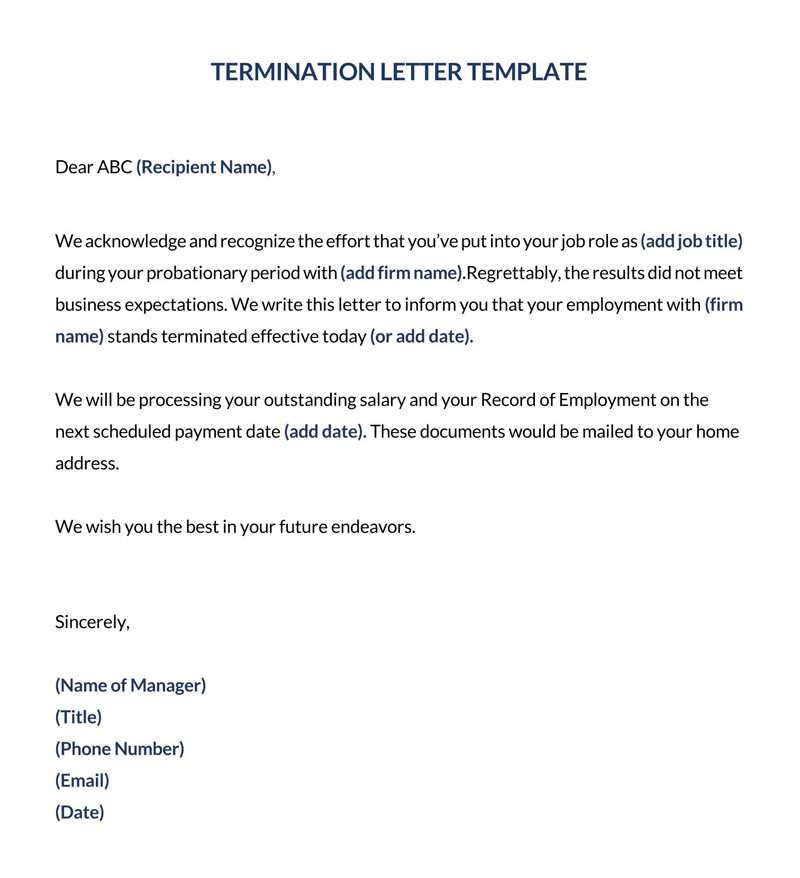
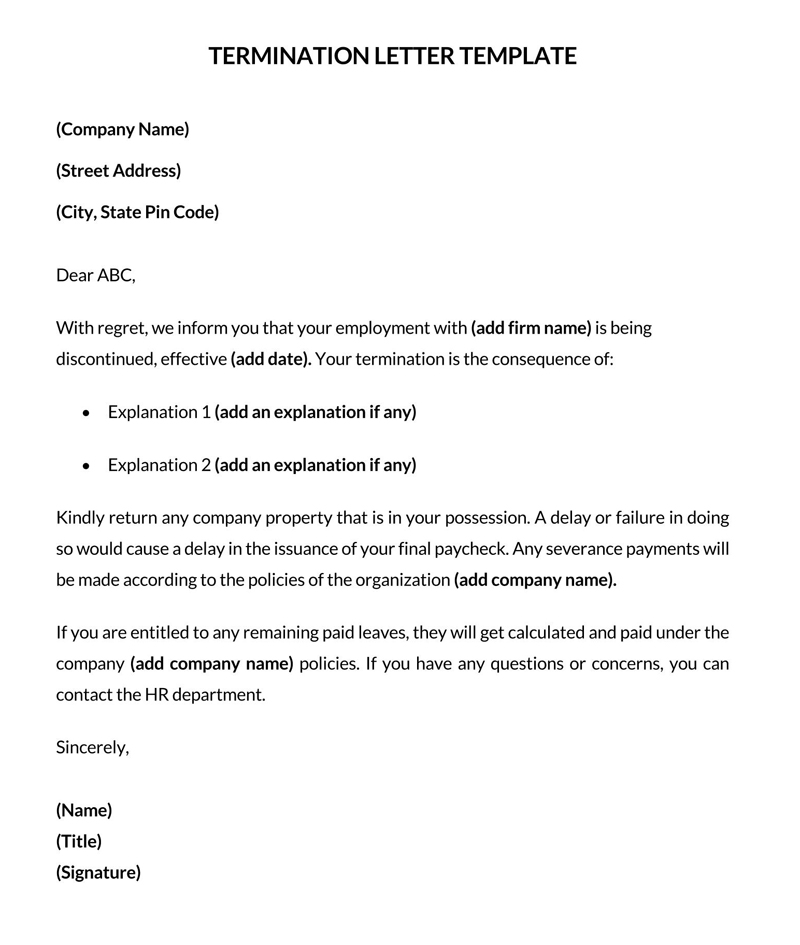
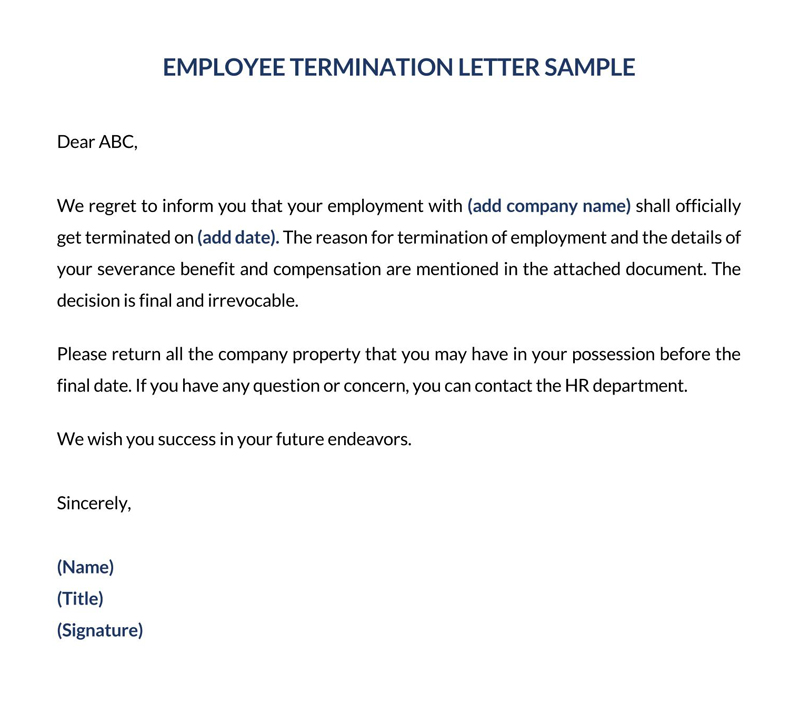
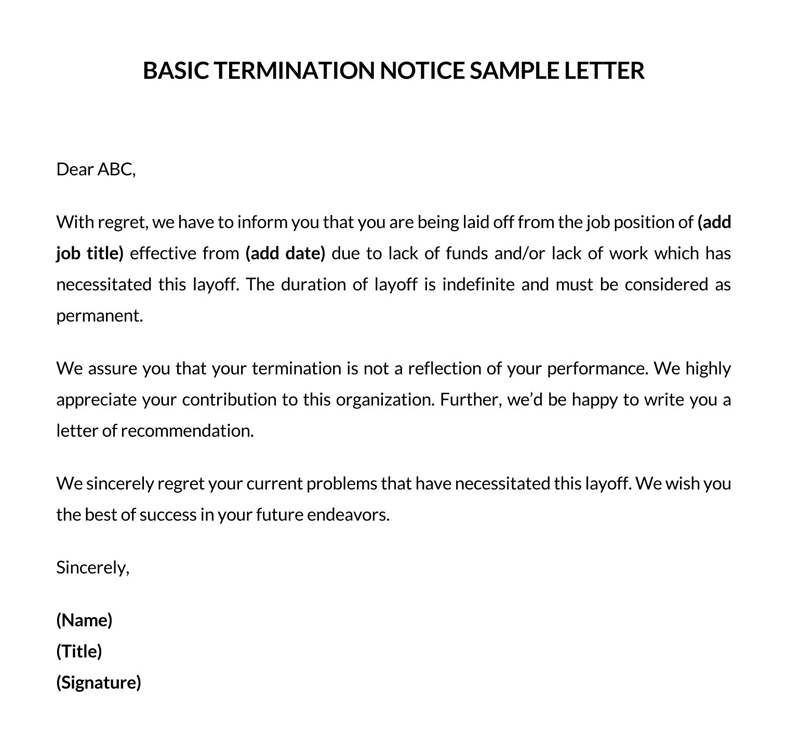
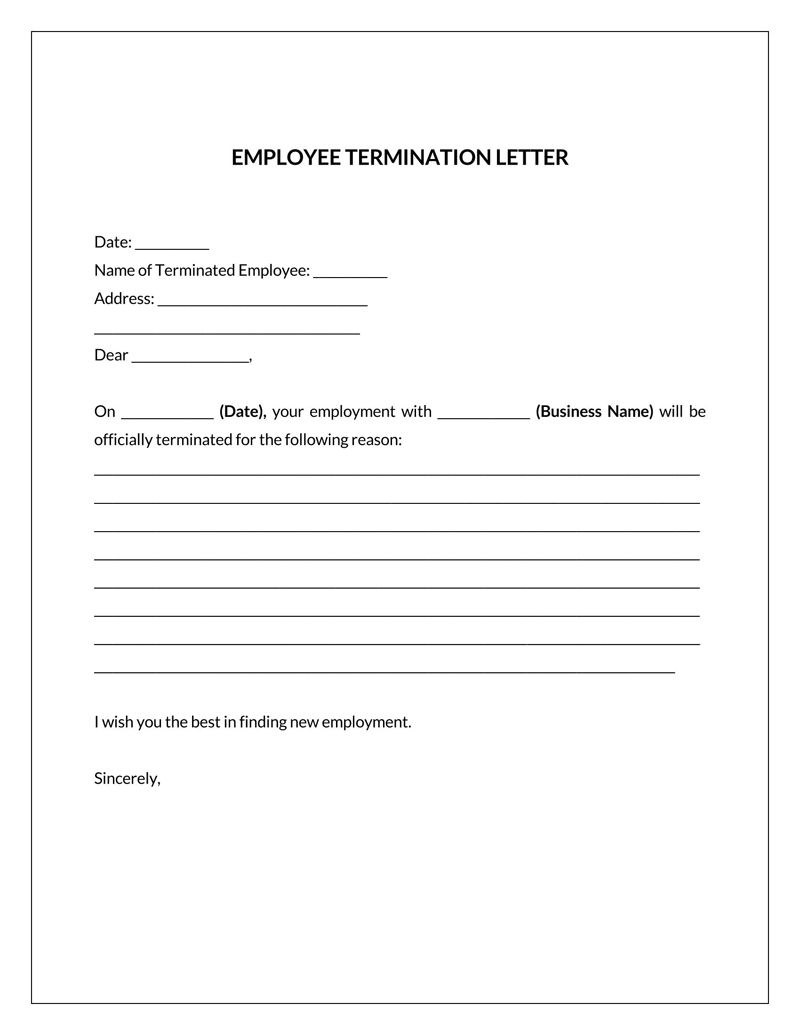
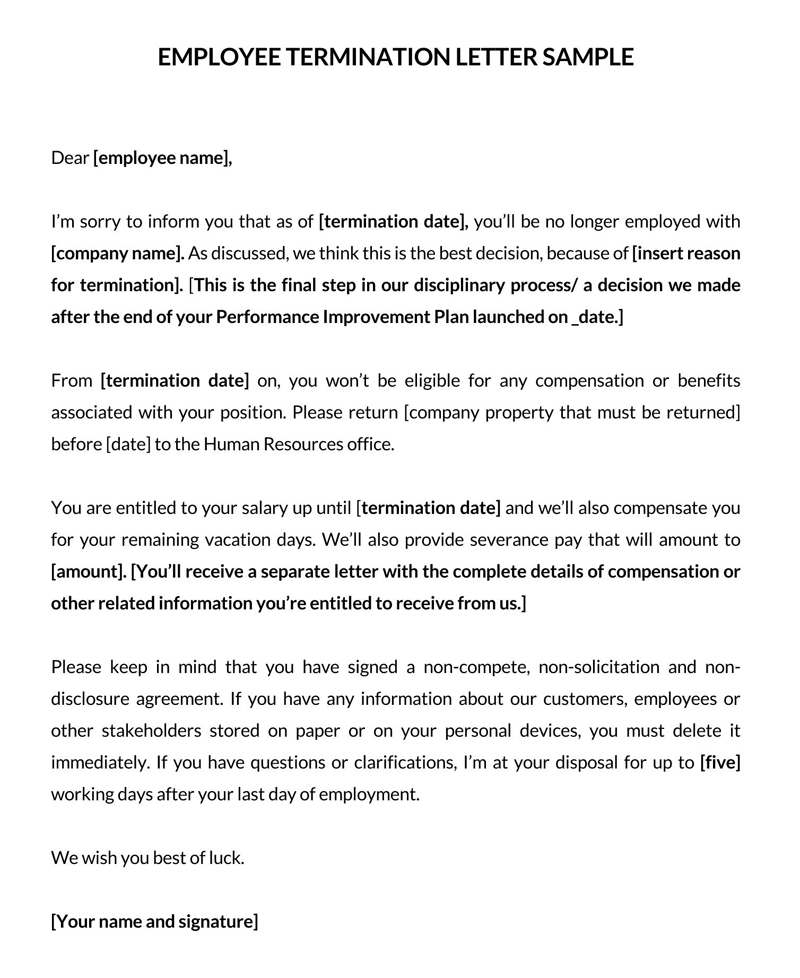
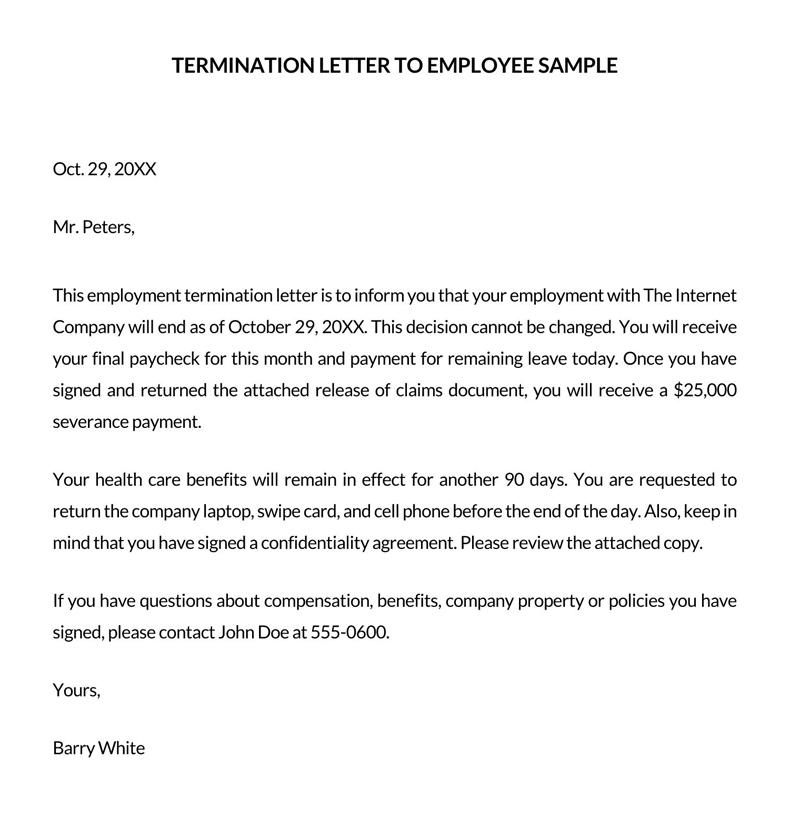
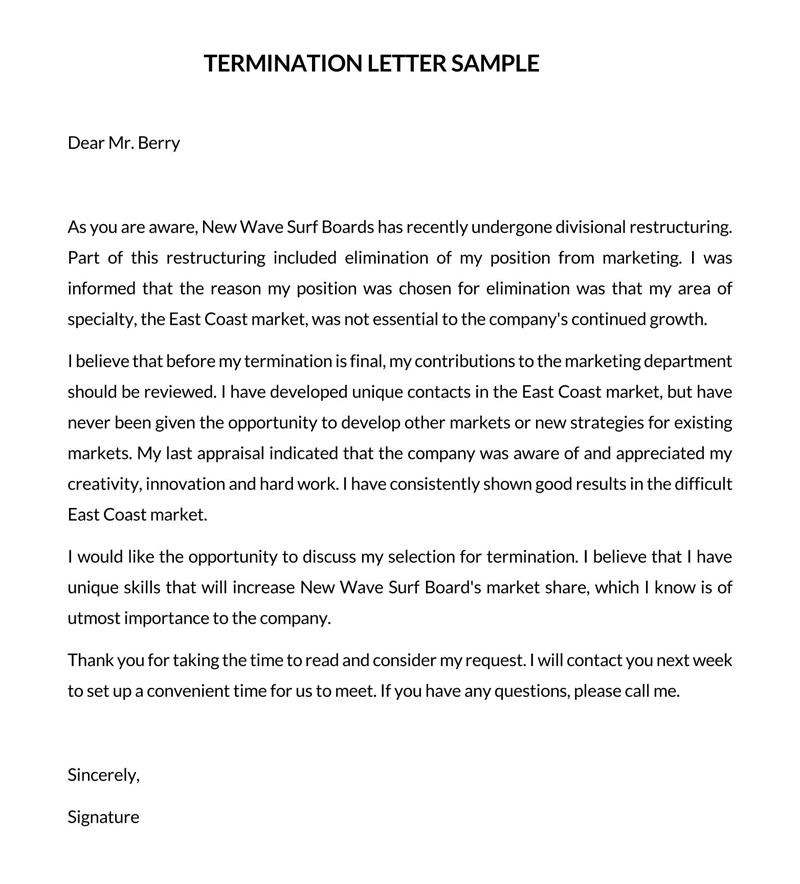
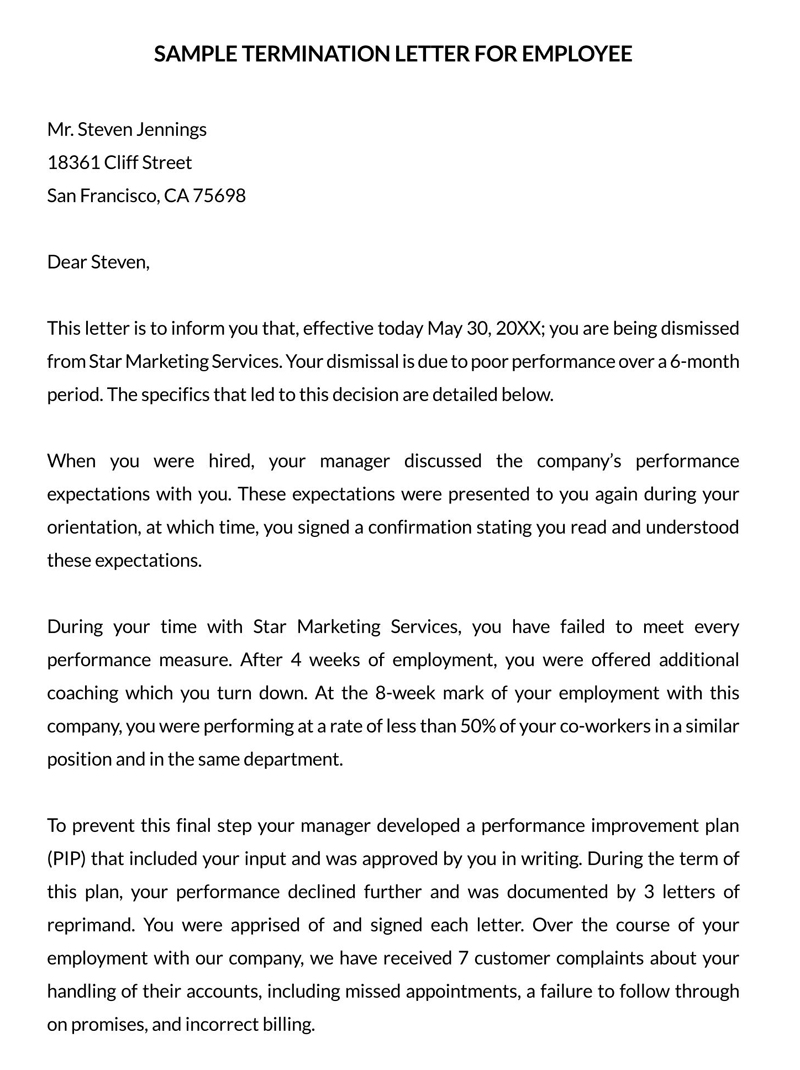
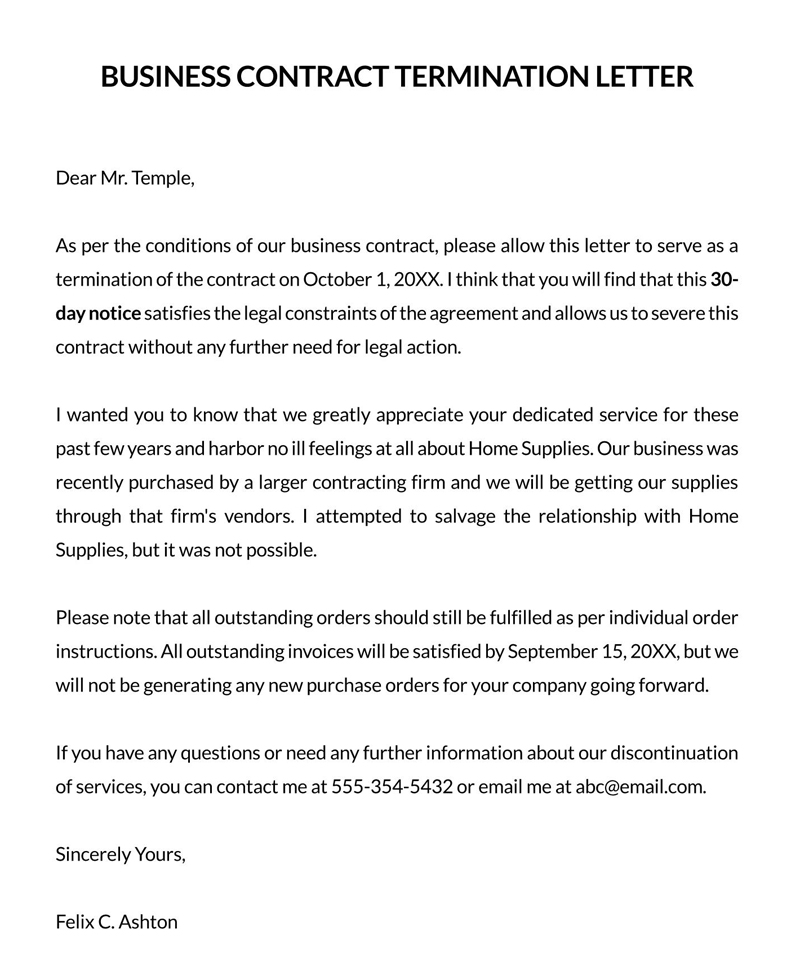
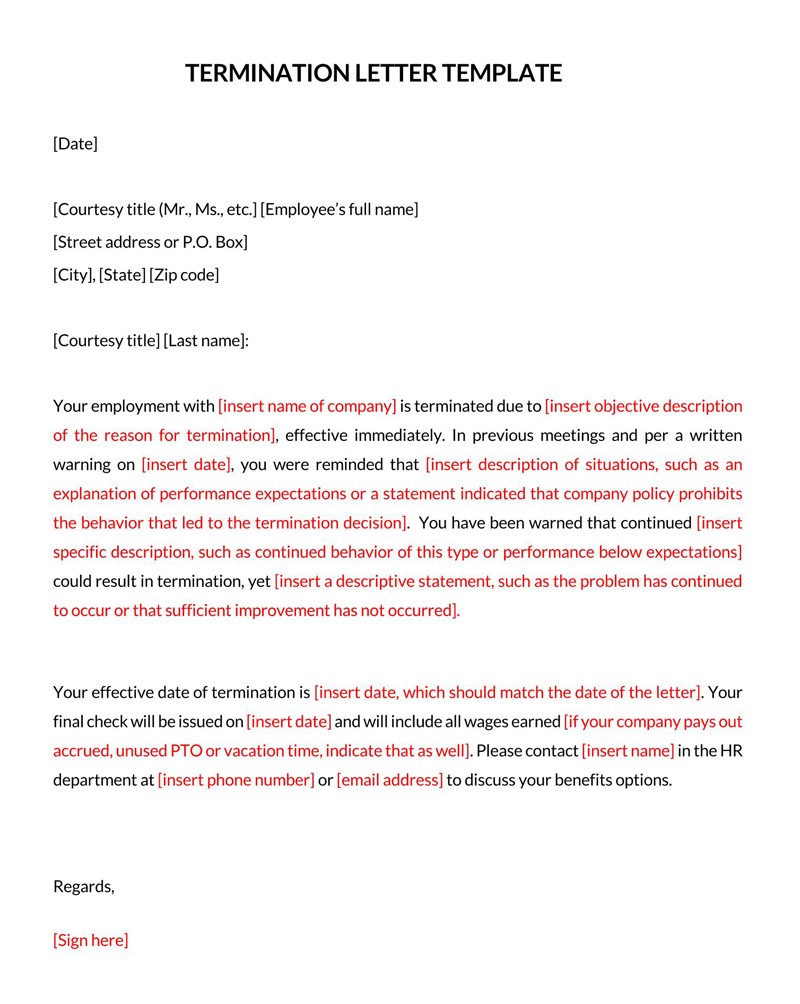
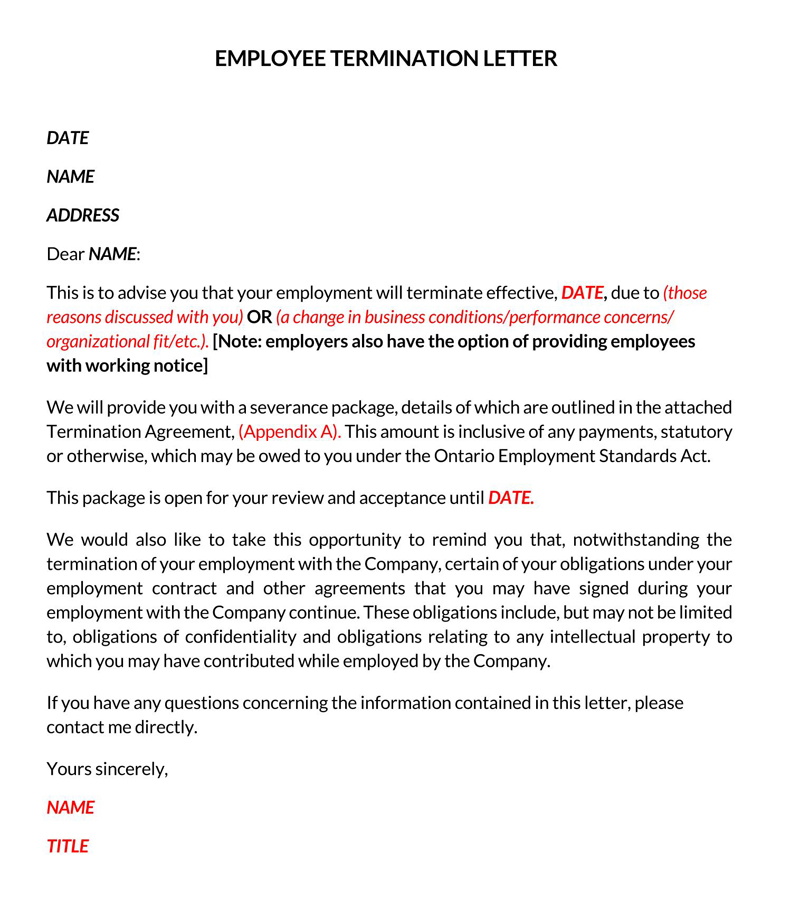
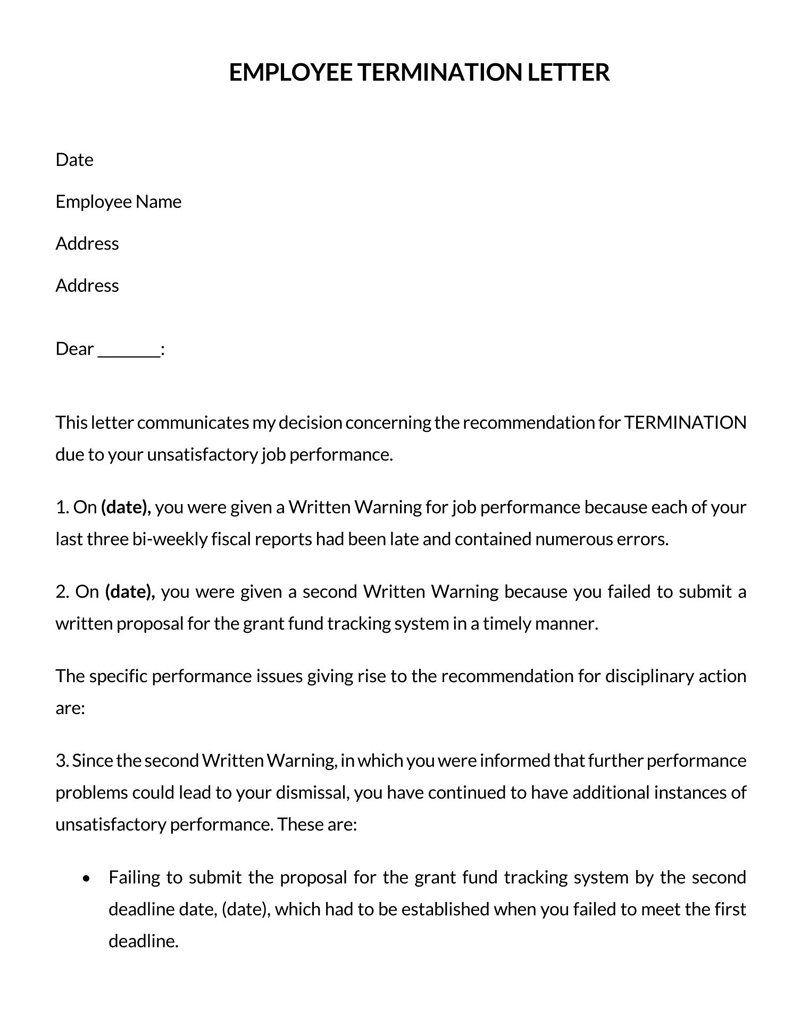
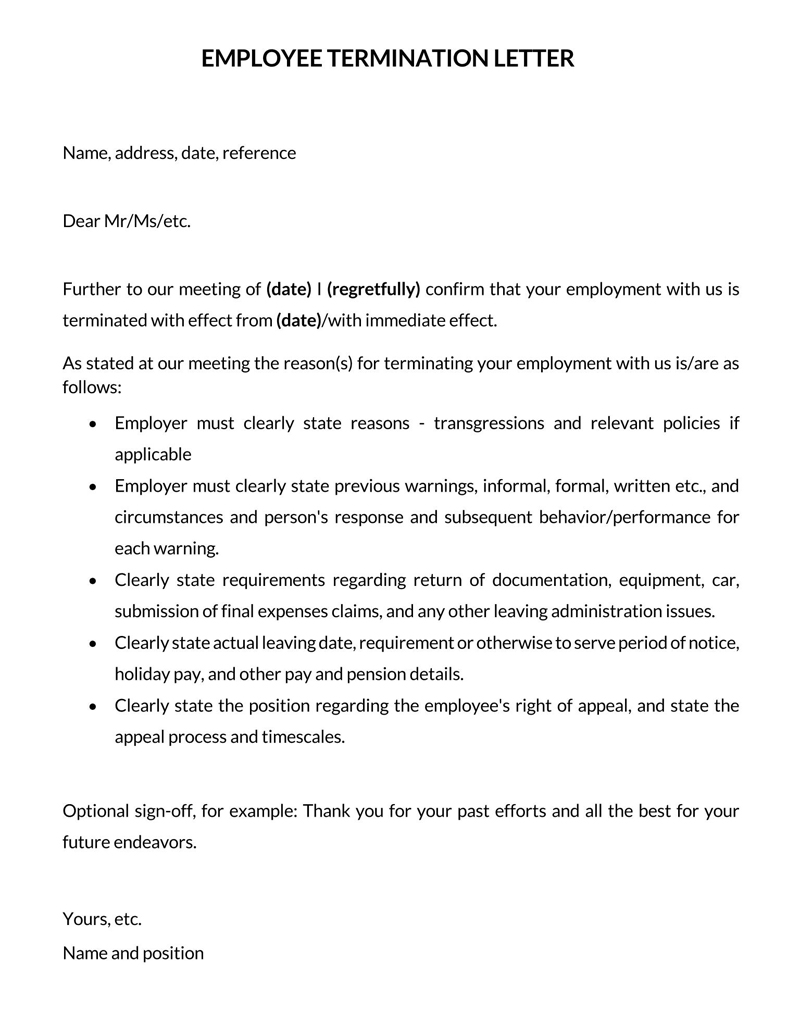
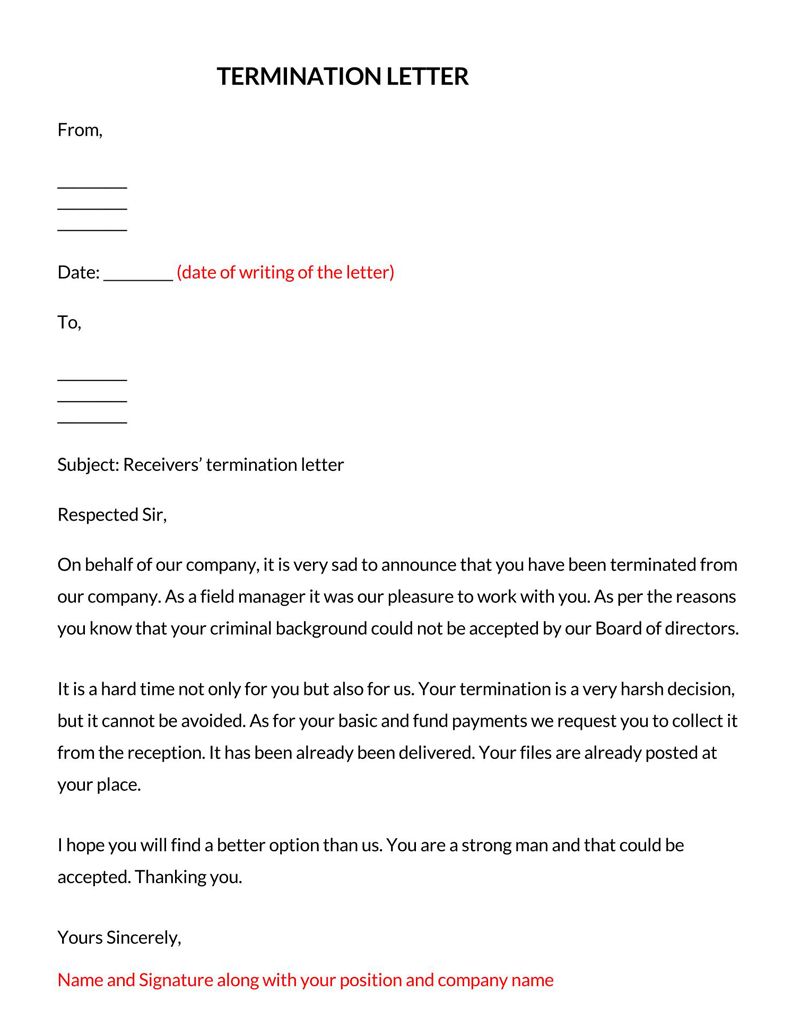
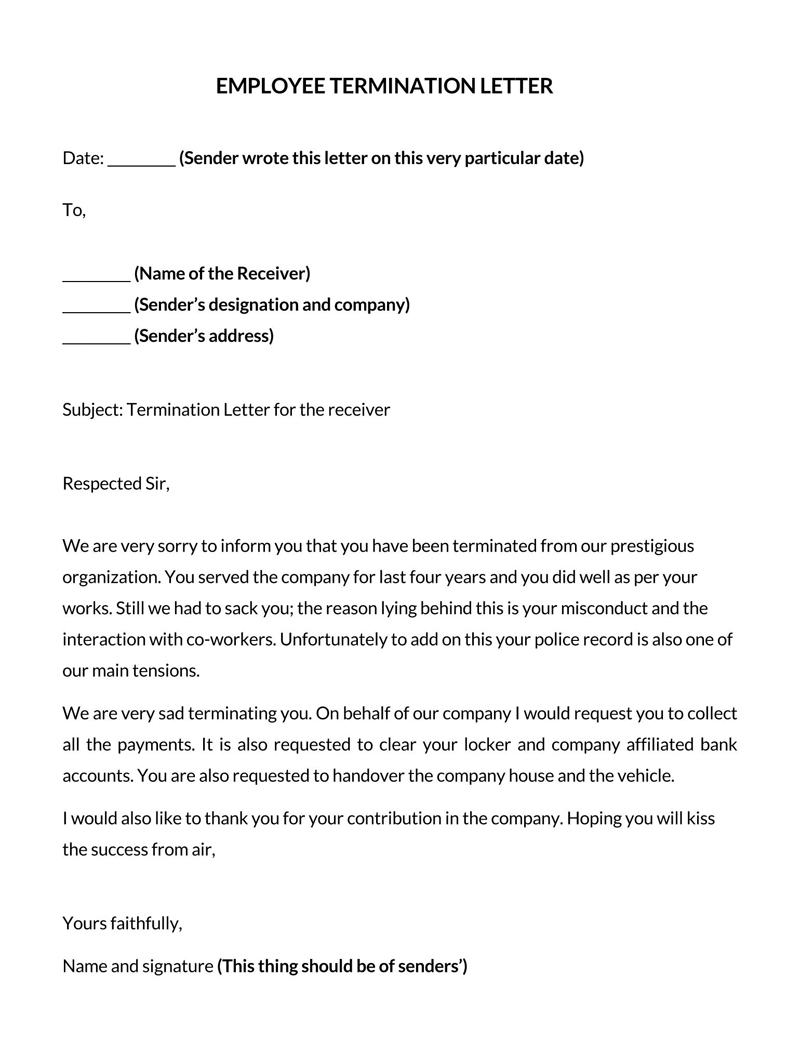
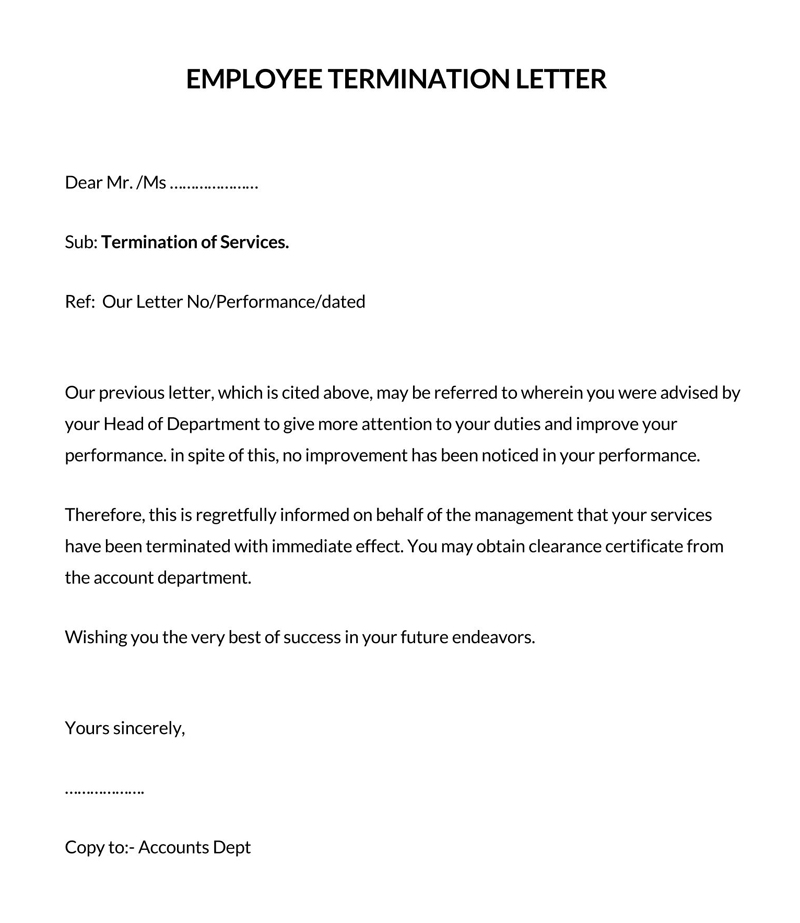
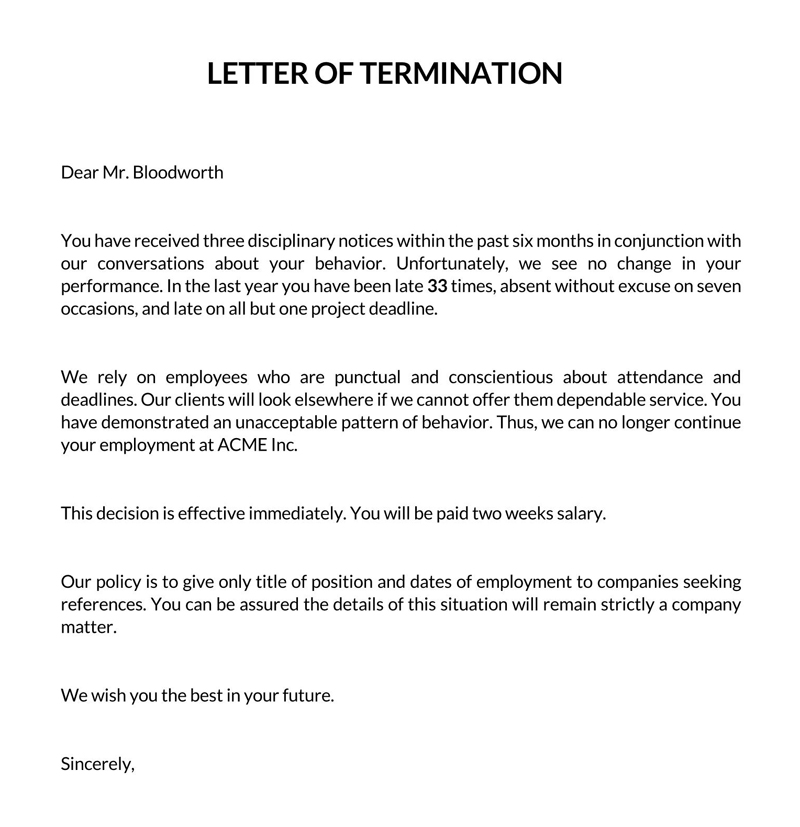
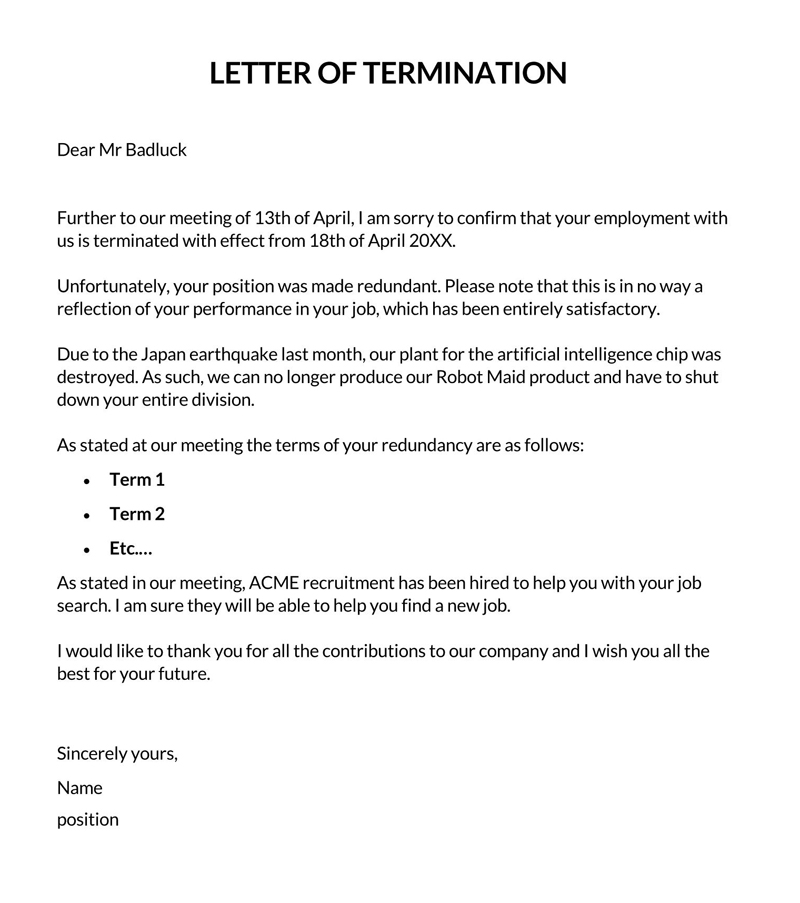
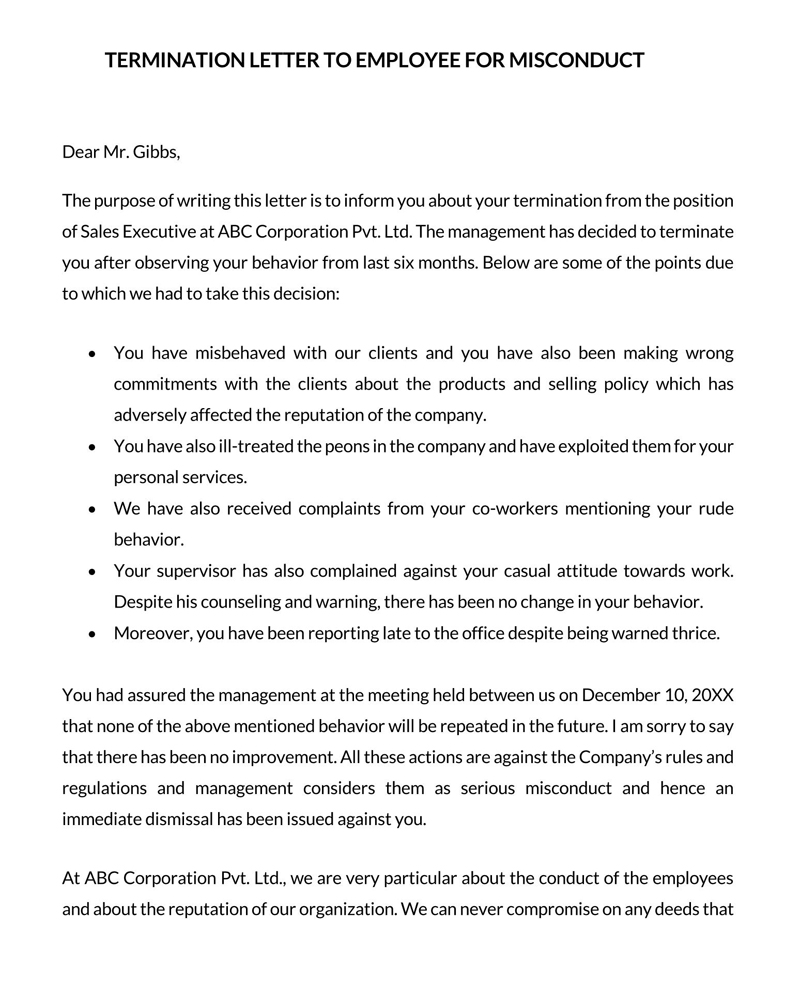
Things to Pay Attention to
There are several things to keep in mind when an employer is considering dismissal. Firstly, they should consult a lawyer if they are unsure about their legal ability to terminate the employee. A lawyer may help provide insight into specific terms required, such as notice length, severance pay, and termination reasons. In addition, if the dismissal is a layoff or a furlough, then a lawyer can dispel any doubt about the specific regulations regarding those contexts.
Secondly, the day of termination should be decided in conjunction with the departmental manager not to disrupt regular service. Afterward, all the relevant policies regarding employee termination should be reviewed and stated in the letter.
It is crucial to make sure that the final version is customized to the company’s specific needs and the context of the dismissal. In many cases, it’s a good idea to have HR proofread the letter for appropriateness.
Things to Avoid
It is crucial to maintain a level of professionalism by avoiding the use of any informal language. Even in cases where the letter’s author has a close relationship with the employee, the termination letter should display a professional tone.
Additionally, all the information should be presented concisely, with only the relevant, accurate details mentioned. Finally, the termination letter should be as brief and to the point as possible.
Frequently Asked Questions
You can write a termination letter by following the guidelines. Most importantly, it should include all identifying information about the employee, the name of the manager, and the severance conditions. It should also include property to be returned and any legal agreements that were signed previously. Ideally, it should be handed to the employee in person.
No federal United States laws require a letter of termination. However, at a state level, it is sometimes required. For this reason, the HR team and legal counsel should be contacted before beginning the termination process.
No, the employee does not need to sign the termination letter for it dismissal process to take effect.
In most cases, employment is considered at will, so it is not always legally required. However, the internal policies of the company may have standard practices regarding this manner. An employer should contact HR and the state requirements to determine whether or not it is necessary to do so.
The date of the termination is always required. If necessary, include the reason for termination and any corresponding compensation that may be applied and list out the conditions of their benefits. Anything that needs to be returned should be documented in the termination letter. It should also serve as a reminder of any previous employment agreements the individual has signed, and finally, HR contact information should be provided.
Generally, the five fair reasons are misconduct, performance standards, redundancy, breach of contractual obligations, and any other claim that considerably affects the company.
Except in the case of union agreements, there is no minimum notice required by employees. However, employers should refer to state and local laws that may vary regarding this situation.
Termination letters should be used most notably when it is required by law. Additionally, it should be delivered when the employer believes that the employee is ineligible for unemployment.
Termination letters are also common when it’s necessary to make the dismissal crystal clear to the employee or when the company feels it prudent to have a record on file in case of a lawsuit. Finally, it can be used in cases where the company wants to assist the individual’s transition and provide information about the due compensation.
Though they are sometimes used interchangeably, discharge of a contract, in legal terms, means that the contract has been fulfilled satisfactorily by the employee. Then the relationship between the two parties has come to a natural end.
In truth, there isn’t any realistic situation where a termination letter would be inappropriate, especially considering a termination letter can include basic information, meaning there is no room for any negative consequences.












